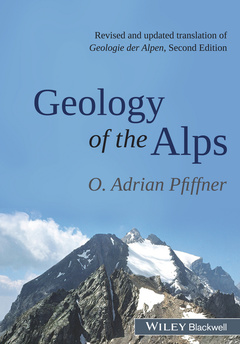Description
Geology of the Alps
Author: Pfiffner O. Adrian
Language: English
Subject for Geology of the Alps:
Keywords
conditions; outcrop; outstanding; geological; laboratory; many; superb natural; processes; geology; role; crucial; history; alpine geology; uptodate; aspects; holistic; book; key; overview; tectonic; plate; framework; brief presentation; suites
Approximative price 61.55 €
In Print (Delivery period: 14 days).
Add to cartPublication date: 06-2014
400 p. · 17.2x24.4 cm · Paperback
Approximative price 122.71 €
In Print (Delivery period: 14 days).
Add to cartPublication date: 06-2014
400 p. · 17.8x25.2 cm · Hardback
Description
/li>Contents
/li>Biography
/li>
The Alps, with their outstanding outcrop conditions, represent a superb natural laboratory for many geological processes, and have played a crucial role in the history of geology. This book gives an up-to-date and holistic overview of the key aspects of Alpine geology.
After a brief presentation of the plate tectonic framework, the rock suites are discussed, starting with the pre-Triassic crystalline basement, followed by Paleozoic, Mesozoic and Cenozoic sedimentary sequences. The lithological description of the rock types is supplemented by a discussion of their paleogeographic and plate tectonic contexts.
The book goes on to describe the structure of the Alps (including the Jura Mountains and the Alpine foreland to the north and south) illustrated by numerous cross-sections. The evolution of the Alps as a mountain chain incorporates a discussion of the Alpine metamorphic history and a compilation of orogenic timetables. The final sections cover the evolution of Alpine drainage patterns and the region’s glacial history.
Readership: The book is essential reading for students and lecturers on Alpine courses and excursions, and all earth-scientists interested in the geology of the region.
1 The Alps in their Plate Tectonic Framework 1
1.1 Older Mountain Chains in Europe 2
1.2 Break-up of Pangaea and Opening of the Alpine Tethys 8
1.3 The Alpine System in Europe 12
1.4 Structure of the Alps 14
References 20
2 The pre-Triassic Basement of the Alps 23
2.1 The pre-Triassic Basement in the Black Forest and Vosges 25
2.2 The pre-Triassic Basement of the External Massifs 29
External Massifs in the Western Alps 30
External Massifs in the Central Alps 32
External Massifs in the Eastern Alps 37
2.3 The pre-Triassic Basement of the Penninic Nappes 39
2.4 The pre-Triassic Basement of the Austroalpine Nappes 40
2.5 The pre-Triassic Basement of the Southern Alps 43
2.6 Palaeozoic Sediments in the Eastern and Southern Alps 49
The Palaeozoic in the Carnic Alps 49
The Palaeozoic of the Greywacke Zone 51
The Palaeozoic of the Innsbruck Quartz Phyllite 51
2.7 The Variscan Orogen at the Close of the Palaeozoic 54
2.8 Post-Variscan Sediments and Volcanics of the Permian 58
The North Swiss Permo-Carboniferous Trough 58
The Permo-Carboniferous in the Helvetic Nappe Complex 59
The Permo-Carboniferous in the Penninic Nappe Complex 62
The Permo-Carboniferous in the Austroalpine Nappe Complex 64
The Permo-Carboniferous in the Southalpine Nappe System 66
References 68
3 The Alpine Domain in the Mesozoic 71
3.1 The Mesozoic Rock Suites 72
The European Continental Margin 72
Oceanic Arms between the Baltic and Africa 81
The Adriatic Continental Margin 90
3.2 Plate Tectonic Evolution 95
Triassic: Epicontinental Platforms 95
Jurassic: Opening up of Oceanic Arms 97
Cretaceous: Opening and Closing of Oceanic Arms 116
References 125
4 The Alpine Domain in the Cenozoic 129
4.1 The Cenozoic Sedimentary Sequences 131
4.2 Late Cretaceous and Paleogene Flyschs 136
4.3 Eocene–Oligocene Flyschs 140
4.4 Oligocene–Miocene Molasse in the Northalpine Foreland Basin 143
4.5 Oligocene–Pliocene Sediments in the Po Basin 147
4.6 The Jura Mountains 148
4.7 Intramontane Basins 149
4.8 Plutonic and Volcanic Rocks 149
4.9 Tectonic and Palaeogeographical Evolution 154
References 165
5 Tectonic Structure of the Alps 169
5.1 The Western Alps 173
The Jura Mountains 178
The Subalpine Chains of the Dauphinois 179
The Penninic Nappes and their Contact with the Adriatic Continental Margin 186
5.2 The Central Alps 192
The Jura Mountains 200
The Molasse Basin 204
The Helvetic Nappe System 209
The Penninic Nappe System 231
The Austroalpine Nappe System 240
The Southalpine Nappe System 242
5.3 The Eastern Alps 245
The Molasse Basin 251
The Helvetic Nappe System 255
The Penninic Nappe System 257
The Austroalpine Nappe System 258
The Southalpine Nappe System and Dolomites 264
5.4 The Deep Structure of the Alps 265
References 275
6 Tectonic Evolution of the Alps 281
6.1 Alpine Metamorphism 283
Regional Distribution of Alpine Metamorphism 283
High-Pressure Metamorphism 286
Temperature-Dominated Regional Metamorphism 290
Contact Metamorphism 291
6.2 The Cretaceous Orogeny 294
6.3 The Cenozoic Orogeny296
6.4 Uplift and Erosion 322
References 330
7 The Latest Steps in the Evolution of the Alps 335
7.1 Miocene and Pliocene Drainage Patterns 337
7.2 Pleistocene Glaciations 342
7.3 Recent Movements and Seismicity 348
7.4 Rockslides, Creeping Slopes, Erosion by Modern Rivers 355
References 364
Index 367
Adrian Pfiffner received his first degree and his PhD from the ETH Zurich. Between 1979 and 1986 he was a researcher at the University of Neuchâtel, and was appointed Professor of Geology at the University of Bern in 1986. His research concentrated on deformation mechanisms in rocks, nappe tectonics, the structure of the Alps incorporating deep seismic profiling, and the structure of the Central Andes of Peru.

